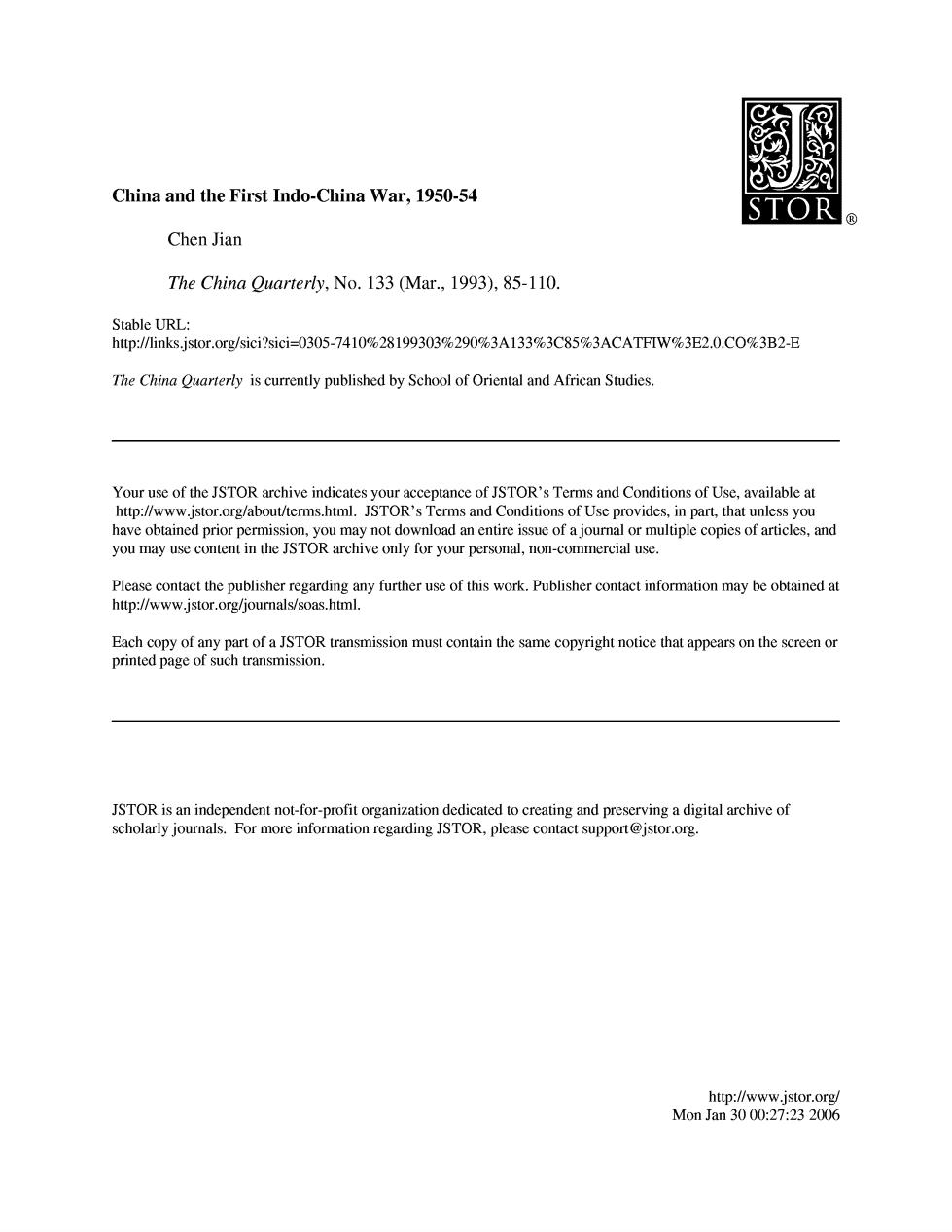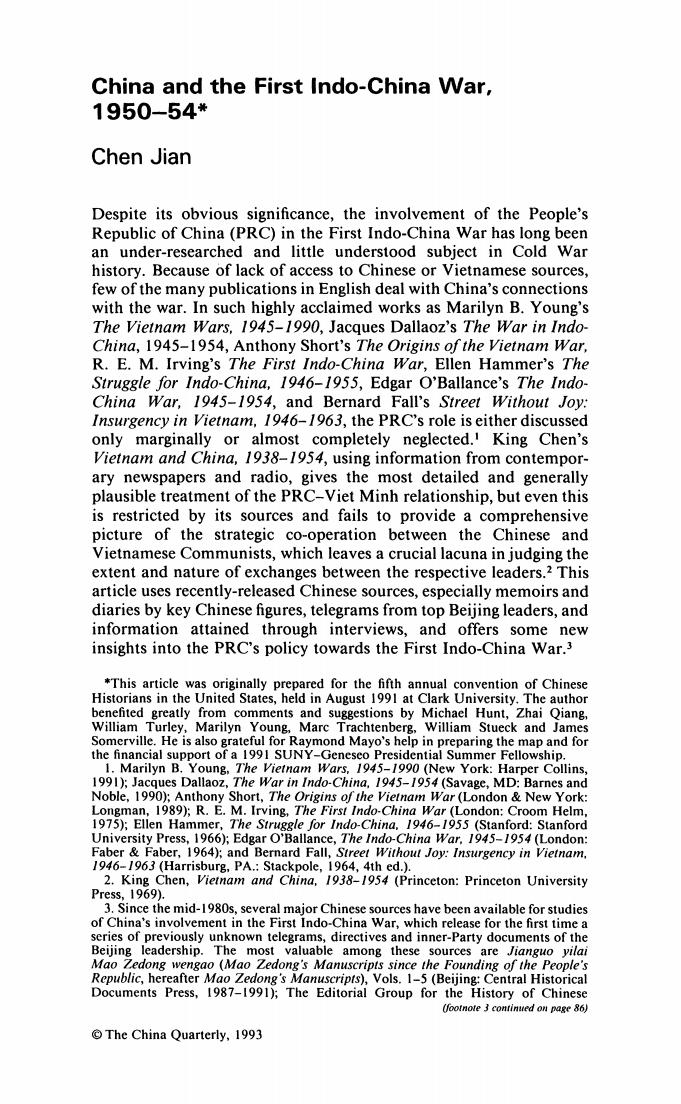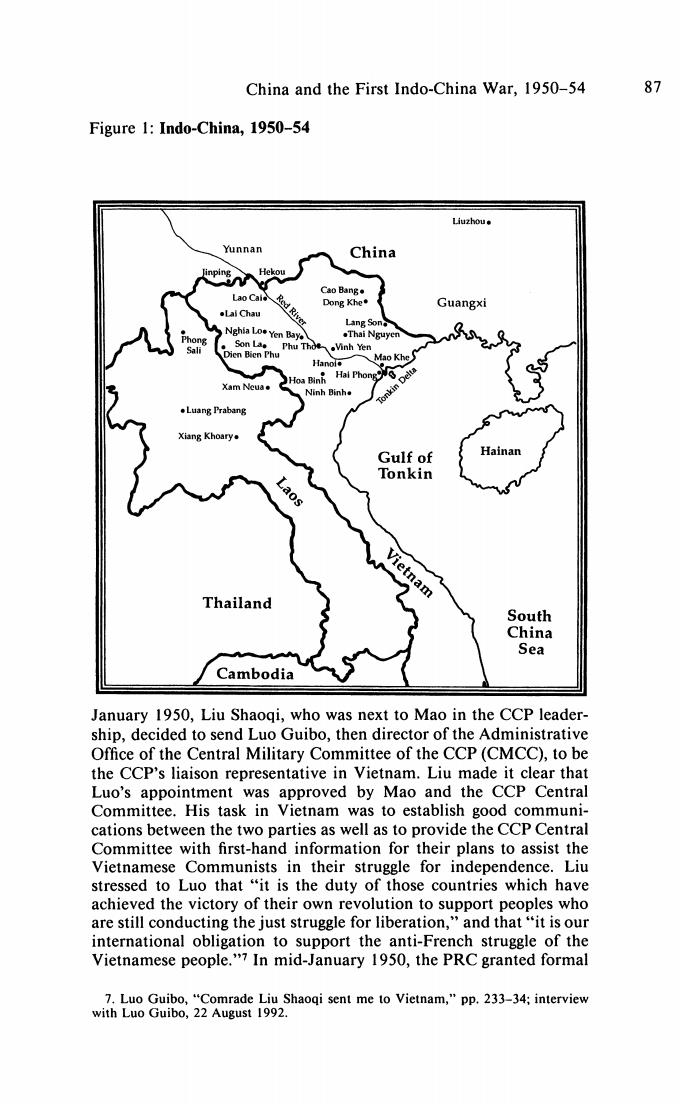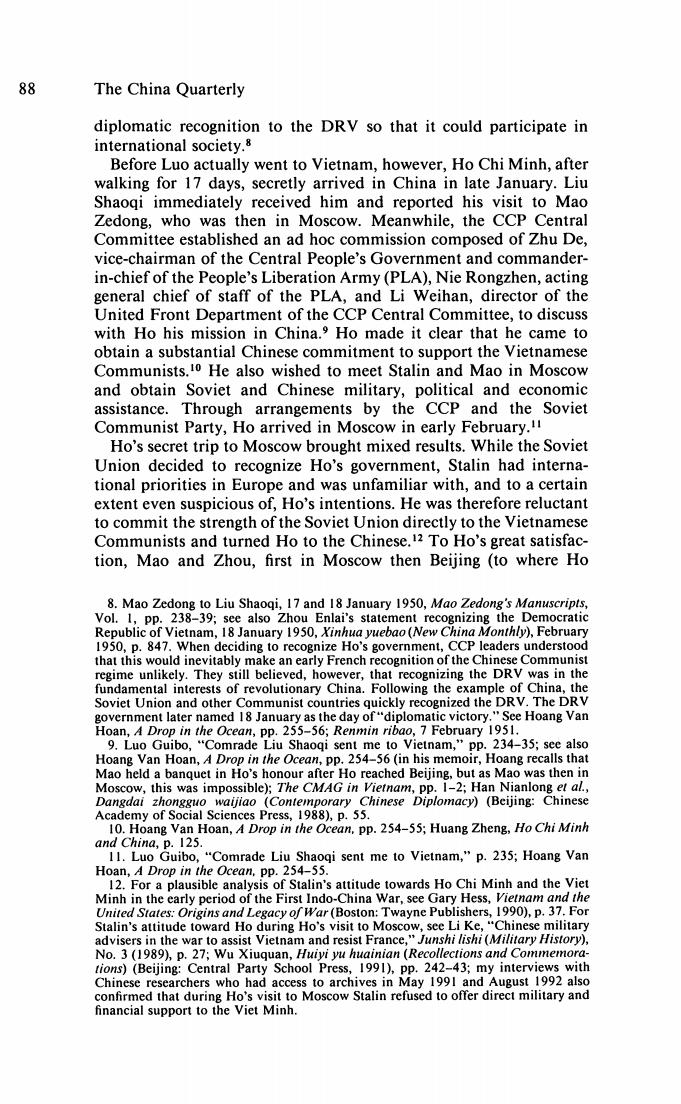
China and the First Indo-China War,1950-54 STOR Chen Jian The China Quarterly,No.133 (Mar.,1993),85-110. Stable URL: http://links.jstor.org/sici?sici=0305-7410%28199303%290%3A133%3C85%3ACATFIW%3E2.0.CO%3B2-E The China Ouarterly is currently published by School of Oriental and African Studies. Your use of the JSTOR archive indicates your acceptance of JSTOR's Terms and Conditions of Use,available at http://www.jstor.org/about/terms.html.JSTOR's Terms and Conditions of Use provides,in part,that unless you have obtained prior permission,you may not download an entire issue of a journal or multiple copies of articles,and you may use content in the JSTOR archive only for your personal,non-commercial use. Please contact the publisher regarding any further use of this work.Publisher contact information may be obtained at http://www.jstor.org/journals/soas.html. Each copy of any part of a JSTOR transmission must contain the same copyright notice that appears on the screen or printed page of such transmission. JSTOR is an independent not-for-profit organization dedicated to creating and preserving a digital archive of scholarly journals.For more information regarding JSTOR,please contact support@jstor.org. http://www.jstor.org/ Mon Jan3000:27:232006

China and the First Indo-China War, 1950-54* Chen Jian Despite its obvious significance,the involvement of the People's Republic of China(PRC)in the First Indo-China War has long been an under-researched and little understood subject in Cold War history.Because of lack of access to Chinese or Vietnamese sources, few of the many publications in English deal with China's connections with the war.In such highly acclaimed works as Marilyn B.Young's The Vietnam Wars,1945-1990,Jacques Dallaoz's The War in Indo- China,1945-1954,Anthony Short's The Origins of the Vietnam War, R.E.M.Irving's The First Indo-China War,Ellen Hammer's The Struggle for Indo-China,1946-1955,Edgar O'Ballance's The Indo- China War,1945-1954,and Bernard Fall's Street Without Joy: Insurgency in Vietnam,1946-1963,the PRC's role is either discussed only marginally or almost completely neglected.King Chen's Vietnam and China,1938-1954,using information from contempor- ary newspapers and radio,gives the most detailed and generally plausible treatment of the PRC-Viet Minh relationship,but even this is restricted by its sources and fails to provide a comprehensive picture of the strategic co-operation between the Chinese and Vietnamese Communists,which leaves a crucial lacuna in judging the extent and nature of exchanges between the respective leaders.2 This article uses recently-released Chinese sources,especially memoirs and diaries by key Chinese figures,telegrams from top Beijing leaders,and information attained through interviews,and offers some new insights into the PRC's policy towards the First Indo-China War.3 *This article was originally prepared for the fifth annual convention of Chinese Historians in the United States,held in August 1991 at Clark University.The author benefited greatly from comments and suggestions by Michael Hunt,Zhai Qiang, William Turley,Marilyn Young,Marc Trachtenberg,William Stueck and James Somerville.He is also grateful for Raymond Mayo's help in preparing the map and for the financial support of a 1991 SUNY-Geneseo Presidential Summer Fellowship. 1.Marilyn B.Young,The Vietnam Wars,1945-1990 (New York:Harper Collins, 1991);Jacques Dallaoz,The War in Indo-China,1945-1954(Savage,MD:Barnes and Noble,1990);Anthony Short,The Origins of the Vietnam War (London New York: Longman,1989);R.E.M.Irving,The First Indo-China War (London:Croom Helm 1975);Ellen Hammer,The Struggle for Indo-China,1946-1955 (Stanford:Stanford University Press,1966);Edgar O'Ballance,The Indo-China War.1945-1954(London: Faber Faber,1964);and Bernard Fall,Street Without Joy:Insurgency in Vietnam. 1946-1963 (Harrisburg,PA.:Stackpole,1964,4th ed.). 2.King Chen,Vietnam and China,1938-1954 (Princeton:Princeton University Press,1969). 3.Since the mid-1980s,several major Chinese sources have been available for studies of China's involvement in the First Indo-China War,which release for the first time a series of previously unknown telegrams,directives and inner-Party documents of the Beijing leadership.The most valuable among these sources are Jianguo yilai Mao Zedong wengao (Mao Zedong's Manuscripts since the Founding of the People's Republic,hereafter Mao Zedong's Manuscripts),Vols.1-5(Beijing:Central Historical Documents Press,1987-1991);The Editorial Group for the History of Chinese (footnote 3 continued on page 86) The China Quarterly,1993

86 The China Quarterly The Indo-China area(Vietnam,Cambodia and Laos)and China are neighbours and the Chinese Communist Party(CCP)and Vietnamese Communists have historically had close connections.Early in the 1920s,Ho Chi Minh and other Vietnamese Communists initiated contacts with their Chinese comrades.Ho himself often came to China and could speak fluent Chinese;in the late 1930s and early 1940s he was even a member of the CCP-led Eighth Route Army.4 After the end of the Second World War,Ho's Indo-China Communist Partys led a national uprising and established the Democratic Republic of Vietnam (DRV)with Ho as president.When the French returned to re-establish control,Ho and his fellow Communists moved to mountainous areas to fight for independence,without support from the outside between 1946 and early 1950. The Chinese Communist victory in 1949 offered Vietnamese Communists a golden opportunity to be backed by a friendly PRC. Both sides were eager to establish close co-operation.In late 1949,the Indo-China Communist Party sent Hoang Van Hoan,a member of its central committee,to China to strengthen ties between the two parties.(Hoang later became the first DRV ambassador to the PRC, defected to China in the late 1970s and died there in 1991.)In early (footnote 3 continued from page 85) Military Advisers in Vietnam (ed.),Zhongguo junshi guwentuan yuanyue kangfa douzheng shishi (A Factual Account of the Participation of Chinese Military Advisory Group in the Struggle ofAssisting Vietnam and Resisting France,hereafter The CMAG in Vietnam)(Beijing:People's Liberation Army Press,1990);Luo Guibo,"Comrade Liu Shaoqi sent me to Vietnam,"in He Jinxiu et al.(eds.),Mianhuai Liu Shaoqi (In Commemoration of Liu Shaogi)(Beijing:Central Historical Documents Press, 1988);Chen Geng,Chen Geng riji (Chen Geng's Diaries),Vol.2 (Beijing:People's Liberation Army Press,1984);and Han Huanzhi and Tan Jinjiao et al,Dangdai zhongguo jundui de junshi gongzuo(The Military Affairs of the Contemporary Chinese Army,hereafter Contemporary Chinese Army)(Beijing:Chinese Academy of Social Sciences Press,1988).Although the Chinese authorities obviously allowed the declassification of these sources,usually on a selective basis,under the politically sensitive circumstance of a total confrontation between Beijing and Hanoi,the scholarly value of this fresh information should not be ignored.While a better scholarly balance could of course be reached with the releasing of the Vietnamese side of the story as well as a more complete declassification of Chinese documents,these new Chinese materials,combined with information from other sources,have created the basis for a new,though not conclusive,study of the PRC's involvement in the first Indo- China War. 4.For a Chinese account of Ho Chi Minh's connection with the Chinese Communist revolution from the 1920s to early 1940s,see Huang Zheng,Ho Zhiming he zhongguo (Ho Chi Minh and China)(Beijing:People's Liberation Army Press,1987),chs.1-4;see also Hoang Van Hoan,A Drop in the Ocean:Hoang Van Hoan's Revolutionary Reminiscences (Beijing:People's Liberation Army Press,1987),chs.3 and 4. 5.The Indo-China Communist Party was established in 1930;after February 1951, its name was changed to the Vietnamese Worker's Party (VWP or Dang Lao Dang Viet Nam). 6.Hoang Van Hoan,A Drop in the Ocean,pp.247-253

China and the First Indo-China War,1950-54 87 Figure 1:Indo-China,1950-54 Liuzhoue Yunnan China Hekou Ca0Bng◆ Lao Cai入 Dong Khe* Guangxi .Lai Chau Lang Son。 phon喀 Nghia Loe Yen Baye .Thai Nguyen Sali Son Lae Phu ThoeVinh Yen Dien Bien Phu Mao Khe Hoa Bin Hal Phong Xam Neua. Ninh Binh。 ●Luang Prabang Xiang Khoary. Gulf of Hainan Tonkin Laos Vietnam Thailand South China Sea Cambodia January 1950,Liu Shaoqi,who was next to Mao in the CCP leader- ship,decided to send Luo Guibo,then director of the Administrative Office of the Central Military Committee of the CCP(CMCC),to be the CCP's liaison representative in Vietnam.Liu made it clear that Luo's appointment was approved by Mao and the CCP Central Committee.His task in Vietnam was to establish good communi- cations between the two parties as well as to provide the CCP Central Committee with first-hand information for their plans to assist the Vietnamese Communists in their struggle for independence.Liu stressed to Luo that "it is the duty of those countries which have achieved the victory of their own revolution to support peoples who are still conducting the just struggle for liberation,"and that"it is our international obligation to support the anti-French struggle of the Vietnamese people."7 In mid-January 1950,the PRC granted formal 7.Luo Guibo,"Comrade Liu Shaoqi sent me to Vietnam,"pp.233-34;interview with Luo Guibo,22 August 1992

88 The China Quarterly diplomatic recognition to the DRV so that it could participate in international society.8 Before Luo actually went to Vietnam,however,Ho Chi Minh,after walking for 17 days,secretly arrived in China in late January.Liu Shaogi immediately received him and reported his visit to Mao Zedong,who was then in Moscow.Meanwhile,the CCP Central Committee established an ad hoc commission composed of Zhu De, vice-chairman of the Central People's Government and commander- in-chief of the People's Liberation Army(PLA),Nie Rongzhen,acting general chief of staff of the PLA,and Li Weihan,director of the United Front Department of the CCP Central Committee,to discuss with Ho his mission in China.Ho made it clear that he came to obtain a substantial Chinese commitment to support the Vietnamese Communists.10 He also wished to meet Stalin and Mao in Moscow and obtain Soviet and Chinese military,political and economic assistance.Through arrangements by the CCP and the Soviet Communist Party,Ho arrived in Moscow in early February.I Ho's secret trip to Moscow brought mixed results.While the Soviet Union decided to recognize Ho's government,Stalin had interna- tional priorities in Europe and was unfamiliar with,and to a certain extent even suspicious of,Ho's intentions.He was therefore reluctant to commit the strength of the Soviet Union directly to the Vietnamese Communists and turned Ho to the Chinese.12 To Ho's great satisfac- tion,Mao and Zhou,first in Moscow then Beijing (to where Ho 8.Mao Zedong to Liu Shaoqi,17 and 18 January 1950,Mao Zedong's Manuscripts, Vol.1,pp.238-39;see also Zhou Enlai's statement recognizing the Democratic Republic of Vietnam,18 January 1950,Xinhua yuebao(New China Monthly),February 1950,p.847.When deciding to recognize Ho's government,CCP leaders understood that this would inevitably make an early French recognition of the Chinese Communist regime unlikely.They still believed,however,that recognizing the DRV was in the fundamental interests of revolutionary China.Following the example of China,the Soviet Union and other Communist countries quickly recognized the DRV.The DRV government later named 18 January as the day of"diplomatic victory."See Hoang Van Hoan,A Drop in the Ocean,pp.255-56;Renmin ribao,7 February 1951. 9.Luo Guibo,"Comrade Liu Shaogi sent me to Vietnam,"pp.234-35;see also Hoang Van Hoan,A Drop in the Ocean,pp.254-56 (in his memoir,Hoang recalls that Mao held a banquet in Ho's honour after Ho reached Beijing,but as Mao was then in Moscow,this was impossible);The CMAG in Vietnam,pp.1-2;Han Nianlong et al., Dangdai zhongguo waijiao (Contemporary Chinese Diplomacy)(Beijing:Chinese Academy of Social Sciences Press,1988),p.55. 10.Hoang Van Hoan,A Drop in the Ocean,pp.254-55;Huang Zheng,Ho Chi Minh and China,p.125. 11.Luo Guibo,"Comrade Liu Shaoqi sent me to Vietnam,"p.235;Hoang Van Hoan,A Drop in the Ocean,pp.254-55. 12.For a plausible analysis of Stalin's attitude towards Ho Chi Minh and the Viet Minh in the early period of the First Indo-China War,see Gary Hess,Vietnam and the United States:Origins and Legacy ofWar (Boston:Twayne Publishers,1990),p.37.For Stalin's attitude toward Ho during Ho's visit to Moscow,see Li Ke,"Chinese military advisers in the war to assist Vietnam and resist France,"Junshi lishi(Military History), No.3(1989),p.27;Wu Xiuquan,Huiyi yu huainian (Recollections and Commemora- tions)(Beijing:Central Party School Press,1991),pp.242-43;my interviews with Chinese researchers who had access to archives in May 1991 and August 1992 also confirmed that during Ho's visit to Moscow Stalin refused to offer direct military and financial support to the Viet Minh